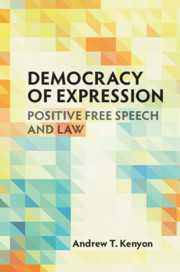64 results
Contents
-
- Book:
- Democracy of Expression
- Published online:
- 28 May 2021
- Print publication:
- 17 June 2021, pp v-viii
-
- Chapter
- Export citation
7 - French Freedom of Communication and Pluralism
-
- Book:
- Democracy of Expression
- Published online:
- 28 May 2021
- Print publication:
- 17 June 2021, pp 170-208
-
- Chapter
- Export citation
3 - Positive Free Speech and Democracy
-
- Book:
- Democracy of Expression
- Published online:
- 28 May 2021
- Print publication:
- 17 June 2021, pp 64-86
-
- Chapter
- Export citation
6 - German Broadcasting Freedom
-
- Book:
- Democracy of Expression
- Published online:
- 28 May 2021
- Print publication:
- 17 June 2021, pp 139-169
-
- Chapter
- Export citation
5 - US Legal Writing on Positive Free Speech
-
- Book:
- Democracy of Expression
- Published online:
- 28 May 2021
- Print publication:
- 17 June 2021, pp 117-138
-
- Chapter
- Export citation
Copyright page
-
- Book:
- Democracy of Expression
- Published online:
- 28 May 2021
- Print publication:
- 17 June 2021, pp iv-iv
-
- Chapter
- Export citation
8 - Framing Communicative Freedom
-
- Book:
- Democracy of Expression
- Published online:
- 28 May 2021
- Print publication:
- 17 June 2021, pp 209-246
-
- Chapter
- Export citation
1 - Introduction
-
- Book:
- Democracy of Expression
- Published online:
- 28 May 2021
- Print publication:
- 17 June 2021, pp 1-37
-
- Chapter
- Export citation
Bibliography
-
- Book:
- Democracy of Expression
- Published online:
- 28 May 2021
- Print publication:
- 17 June 2021, pp 247-271
-
- Chapter
- Export citation
Index
-
- Book:
- Democracy of Expression
- Published online:
- 28 May 2021
- Print publication:
- 17 June 2021, pp 272-282
-
- Chapter
- Export citation
Preface
-
- Book:
- Democracy of Expression
- Published online:
- 28 May 2021
- Print publication:
- 17 June 2021, pp ix-x
-
- Chapter
- Export citation
4 - Positive Human Rights and Political Freedom
-
- Book:
- Democracy of Expression
- Published online:
- 28 May 2021
- Print publication:
- 17 June 2021, pp 87-116
-
- Chapter
- Export citation
2 - Positive Free Speech from Media Studies and Law
-
- Book:
- Democracy of Expression
- Published online:
- 28 May 2021
- Print publication:
- 17 June 2021, pp 38-63
-
- Chapter
- Export citation

Democracy of Expression
- Positive Free Speech and Law
-
- Published online:
- 28 May 2021
- Print publication:
- 17 June 2021
Introduction
-
-
- Book:
- Across Intellectual Property
- Published online:
- 27 March 2020
- Print publication:
- 12 March 2020, pp 1-8
-
- Chapter
- Export citation
Laudatio
-
- Book:
- Across Intellectual Property
- Published online:
- 27 March 2020
- Print publication:
- 12 March 2020, pp 315-325
-
- Chapter
- Export citation
Copyright page
-
- Book:
- Across Intellectual Property
- Published online:
- 27 March 2020
- Print publication:
- 12 March 2020, pp vi-vi
-
- Chapter
- Export citation
18 - Intellectual Property Law and Empirical Research
- from Part III - Across Disciplines
-
-
- Book:
- Across Intellectual Property
- Published online:
- 27 March 2020
- Print publication:
- 12 March 2020, pp 240-252
-
- Chapter
- Export citation
Frontispiece
-
- Book:
- Across Intellectual Property
- Published online:
- 27 March 2020
- Print publication:
- 12 March 2020, pp iii-iv
-
- Chapter
- Export citation
Notes on Contributors
-
- Book:
- Across Intellectual Property
- Published online:
- 27 March 2020
- Print publication:
- 12 March 2020, pp x-xvi
-
- Chapter
- Export citation



